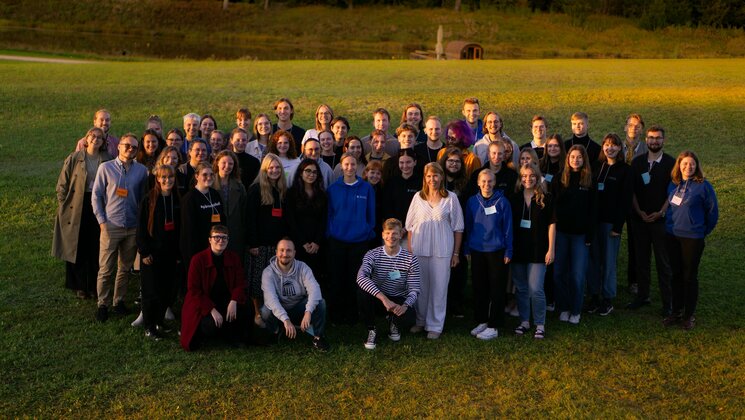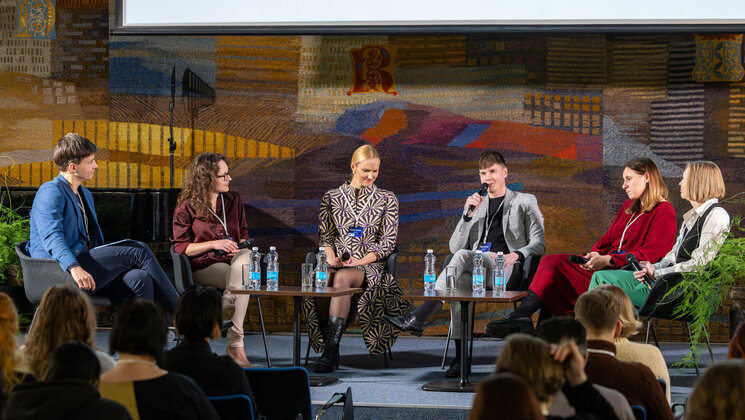-
Faculty of Arts and HumanitiesDean's Office, Faculty of Arts and HumanitiesJakobi 2, r 116-121 51005 Tartu linn, Tartu linn, Tartumaa EST0Institute of History and ArchaeologyJakobi 2 51005 Tartu linn, Tartu linn, Tartumaa EST0Institute of Estonian and General LinguisticsJakobi 2, IV korrus 51005 Tartu linn, Tartu linn, Tartumaa EST0Institute of Philosophy and SemioticsJakobi 2, III korrus, ruumid 302-337 51005 Tartu linn, Tartu linn, Tartumaa EST0Institute of Cultural ResearchÜlikooli 16 51003 Tartu linn, Tartu linn, Tartumaa EST0Institute of Foreign Languages and CulturesLossi 3 51003 Tartu linn, Tartu linn, Tartumaa EST0School of Theology and Religious StudiesÜlikooli 18 50090 Tartu linn, Tartu linn, Tartumaa EST0Viljandi Culture AcademyPosti 1 71004 Viljandi linn, Viljandimaa EST0Professors emeriti, Faculty of Arts and Humanities0Associate Professors emeriti, Faculty of Arts and Humanities0Faculty of Social SciencesDean's Office, Faculty of Social SciencesLossi 36 51003 Tartu linn, Tartu linn, Tartumaa EST0Institute of EducationJakobi 5 51005 Tartu linn, Tartu linn, Tartumaa EST0Johan Skytte Institute of Political StudiesLossi 36, ruum 301 51003 Tartu linn, Tartu linn, Tartumaa EST0School of Economics and Business AdministrationNarva mnt 18 51009 Tartu linn, Tartu linn, Tartumaa EST0Institute of PsychologyNäituse 2 50409 Tartu linn, Tartu linn, Tartumaa EST0School of LawNäituse 20 - 324 50409 Tartu linn, Tartu linn, Tartumaa EST0Institute of Social StudiesLossi 36 51003 Tartu linn, Tartu linn, Tartumaa EST0Narva CollegeRaekoja plats 2 20307 Narva linn, Ida-Virumaa EST0Pärnu CollegeRingi 35 80012 Pärnu linn, Pärnu linn, Pärnumaa EST0Professors emeriti, Faculty of Social Sciences0Associate Professors emeriti, Faculty of Social Sciences0Faculty of MedicineDean's Office, Faculty of MedicineRavila 19 50411 Tartu linn, Tartu linn, Tartumaa ESTInstitute of Biomedicine and Translational MedicineBiomeedikum, Ravila 19 50411 Tartu linn, Tartu linn, Tartumaa ESTInstitute of PharmacyNooruse 1 50411 Tartu linn, Tartu linn, Tartumaa ESTInstitute of DentistryL. Puusepa 1a 50406 Tartu linn, Tartu linn, Tartumaa ESTInstitute of Clinical MedicineL. Puusepa 8 50406 Tartu linn, Tartu linn, Tartumaa ESTInstitute of Family Medicine and Public HealthRavila 19 50411 Tartu linn, Tartu linn, Tartumaa ESTInstitute of Sport Sciences and PhysiotherapyUjula 4 51008 Tartu linn, Tartu linn, Tartumaa ESTProfessors emeriti, Faculty of Medicine0Associate Professors emeriti, Faculty of Medicine0Faculty of Science and TechnologyDean's Office, Faculty of Science and TechnologyVanemuise 46 - 208 51003 Tartu linn, Tartu linn, Tartumaa ESTInstitute of Computer ScienceNarva mnt 18 51009 Tartu linn, Tartu linn, Tartumaa ESTInstitute of GenomicsRiia 23b/2 51010 Tartu linn, Tartu linn, Tartumaa ESTEstonian Marine Institute0Institute of PhysicsInstitute of ChemistryRavila 14a 50411 Tartu linn, Tartu linn, Tartumaa EST0Institute of Mathematics and StatisticsNarva mnt 18 51009 Tartu linn, Tartu linn, Tartumaa EST0Institute of Molecular and Cell BiologyRiia 23, 23b - 134 51010 Tartu linn, Tartu linn, Tartumaa ESTTartu ObservatoryObservatooriumi 1 61602 Tõravere alevik, Nõo vald, Tartumaa EST0Institute of TechnologyNooruse 1 50411 Tartu linn, Tartu linn, Tartumaa ESTInstitute of Ecology and Earth SciencesJ. Liivi tn 2 50409 Tartu linn, Tartu linn, Tartumaa ESTProfessors emeriti, Faculty of Science and Technology0Associate Professors emeriti, Faculty of Science and Technology0Institute of BioengineeringArea of Academic SecretaryHuman Resources OfficeUppsala 6, Lossi 36 51003 Tartu linn, Tartu linn, Tartumaa EST0Area of Head of FinanceFinance Office0Area of Director of AdministrationInformation Technology Office0Administrative OfficeÜlikooli 17 (III korrus) 51005 Tartu linn, Tartu linn, Tartumaa EST0Estates Office0Marketing and Communication OfficeÜlikooli 18, ruumid 102, 104, 209, 210 50090 Tartu linn, Tartu linn, Tartumaa EST0Area of RectorRector's Strategy OfficeInternal Audit OfficeArea of Vice Rector for Academic AffairsOffice of Academic Affairs0University of Tartu Youth AcademyUppsala 10 51003 Tartu linn, Tartu linn, Tartumaa EST0Student Union OfficeÜlikooli 18b 51005 Tartu linn, Tartu linn, Tartumaa EST0Centre for Learning and TeachingArea of Vice Rector for ResearchUniversity of Tartu LibraryW. Struve 1 50091 Tartu linn, Tartu linn, Tartumaa EST0Grant OfficeArea of Vice Rector for DevelopmentCentre for Entrepreneurship and InnovationNarva mnt 18 51009 Tartu linn, Tartu linn, Tartumaa EST0University of Tartu Natural History Museum and Botanical GardenVanemuise 46 51003 Tartu linn, Tartu linn, Tartumaa EST0International Cooperation and Protocol Office0University of Tartu MuseumLossi 25 51003 Tartu linn, Tartu linn, Tartumaa EST0
EST4MORE Project Empowers Moldovan Students and Researchers Through Innovative Learning and Writing Bootcamps

The visits of master’s and doctoral students were organised within the framework of the project “Estonia's best practices for enhancement of Moldova's higher education capacities” (EST4MORE), funded by the Estonian Centre for International Development (ESTDEV) and coordinated by the Johan Skytte Institute of Political Studies at the University of Tartu (UT), in partnership with Moldova State University (MSU).
EST4MORE aims to tackle challenges within Moldovan higher education institutions by targeting three key audiences. Its objective is to equip educators with digital skills, enhance master’s students' understanding of European integration and future job market competitiveness, and uplift doctoral students' professional skills through networking opportunities with Estonian researchers, facilitating knowledge transfer and best practices.
Between September 30 and October 06, ten master’s students and three staff members of Moldova State University joined an intensive study week to discuss Moldova’s Europeanization and challenges of EU enlargement. The activities combined in-class learning and out-class activities as well as practical and academic learning.
Together with our in-house Skytte lecturers, from Monday to Thursday, Moldovan students discussed such relevant topics as dilemmas of the EU foreign policy, ideas and understanding of Europe, Estonia’s transition and digital transformation, conflict resolution practices, and art and music as forms of protest in the former Soviet space.
On Friday and Saturday, the group moved to Tallinn where students and lecturers met stakeholders and decision-makers and visited the Estonian Parliament, Tallinn’s Europe House, and the Estonian Centre for International Development where they had the opportunity to discuss their experience and practical cases of Europeanization with ESTDEV Director Klen Jäärats and with project manager Marika Kundla.
Across the study week, under the guidance of Dr. Stefano Braghiroli and Ms. Anna Beitane, participants were exposed to innovative European Studies pedagogies and interactive learning methods and teaching tools. By working in small groups, students exchanged ideas, experiences, and learned from each other. They presented their group work and received valuable feedback from both Skytte and MSU staff.
Two weeks later, between 16 and 20 October, four doctoral students from Moldova State University participated in an Academic Writing Bootcamp at the Johan Skytte Institute. The bootcamp aimed to sharpen their research skills and included a series of workshops and seminars led and organized by Catherine Gibson and Sandra Hagelin. The sessions on academic writing and research communication included workshops such as “Hack Your Writing Process” and “How to Effectively Communicate Your Research in Written and Spoken Formats.”
In addition to the technical skills, the participants engaged in meaningful discussions on conducting high-quality research, interacted with in-house Skytte staff, joined an ad-hoc Emerging Scholar workshop moderated and managed by our Skytte doctoral students, and attended the institute’s research colloquia. On Saturday and Sunday, the visiting doctoral students joined our institute’s Kääriku Autumn School which provided a useful platform for our guests to network, exchange ideas, and refine their academic outputs. In addition, they had the unique opportunity to attend inspiring lectures by Estonia’s Minister of Education, Kristina
Kallas; Luukas Kristjan Ilves, former Chief Information Officer of Estonia; and Keit Kasemets, Secretary General of the Ministry of Climate.
According to Dr. Stefano Braghiroli, Associate Professor of European Studies at the University of Tartu and academic coordinator of the project, “the study week and students’ exposure to innovative and interactive teaching in the field of European studies has the potential to determine a concrete and positive impact on Moldova’s path towards full EU membership, while ideally connecting Chisinau and Tartu. By bridging effective academic exchange and pro-active learning, we can contribute to turning the next generation of local graduates into the first generation of Moldova’s EU citizens.”
Dr. Catherine Gibson, Lecturer in East European and Eurasian Studies and Sandra Hagelin, Junior Researcher at the Johan Skytte Institute, commented on the bootcamp experience: “The possibility to involve PhD students in such intensive and practical writing workshops is incredibly valuable. It not only enhances their research skills but also fosters a sense of academic community across borders, contributing to the overall professional growth of Moldova’s next generation of scholars.”
Read more similar news






